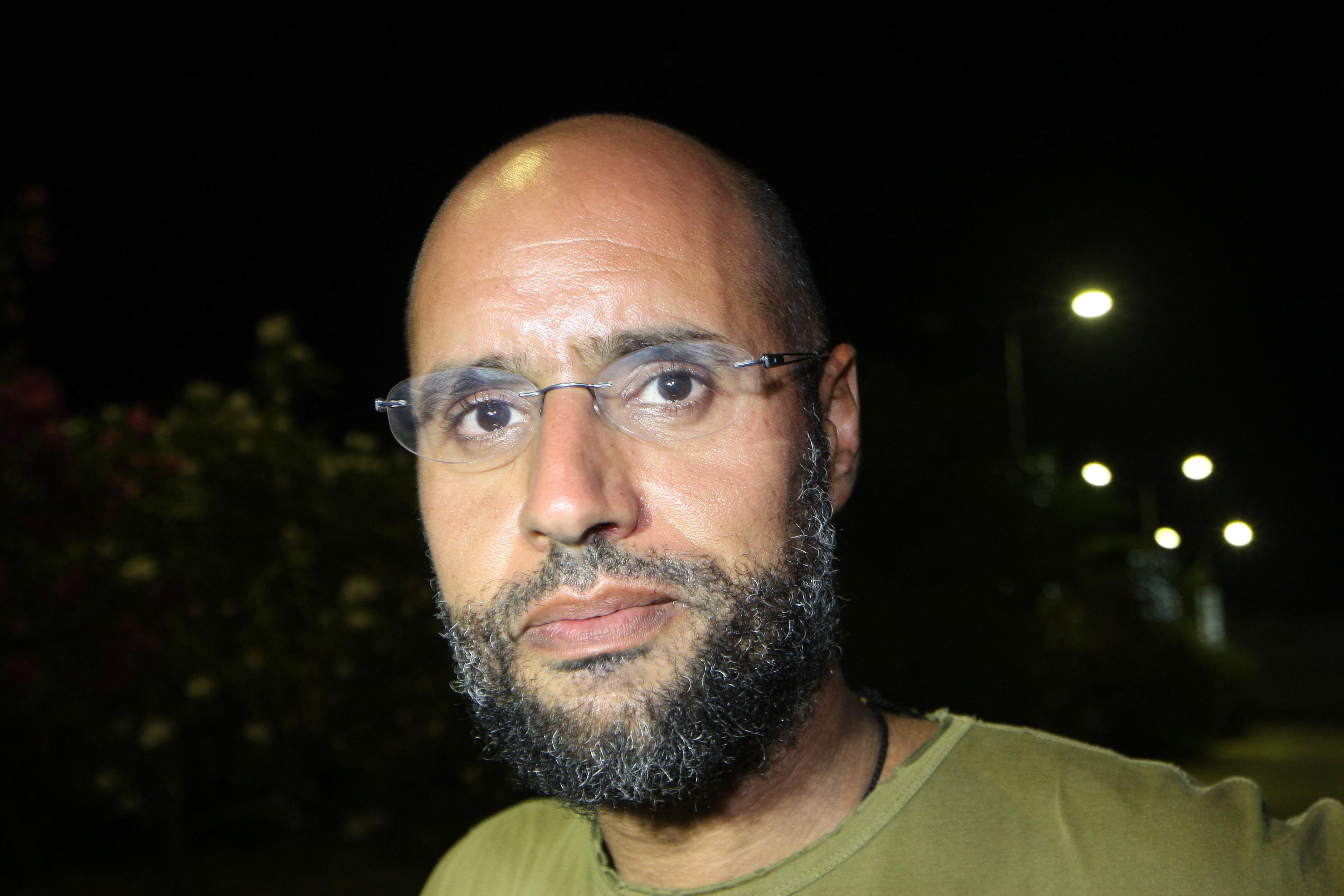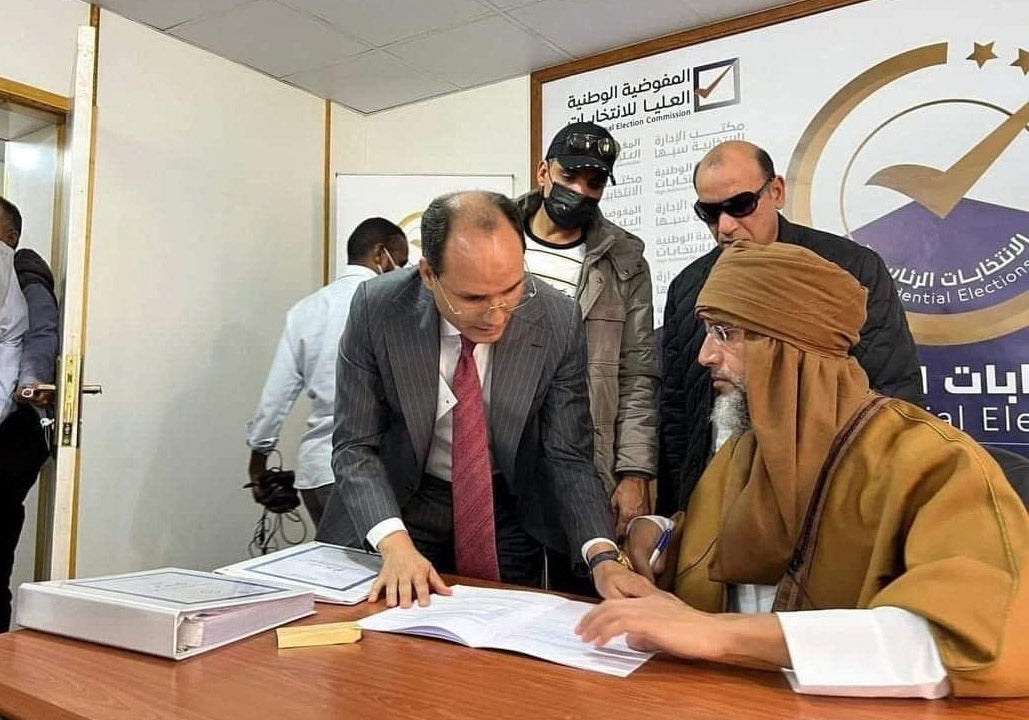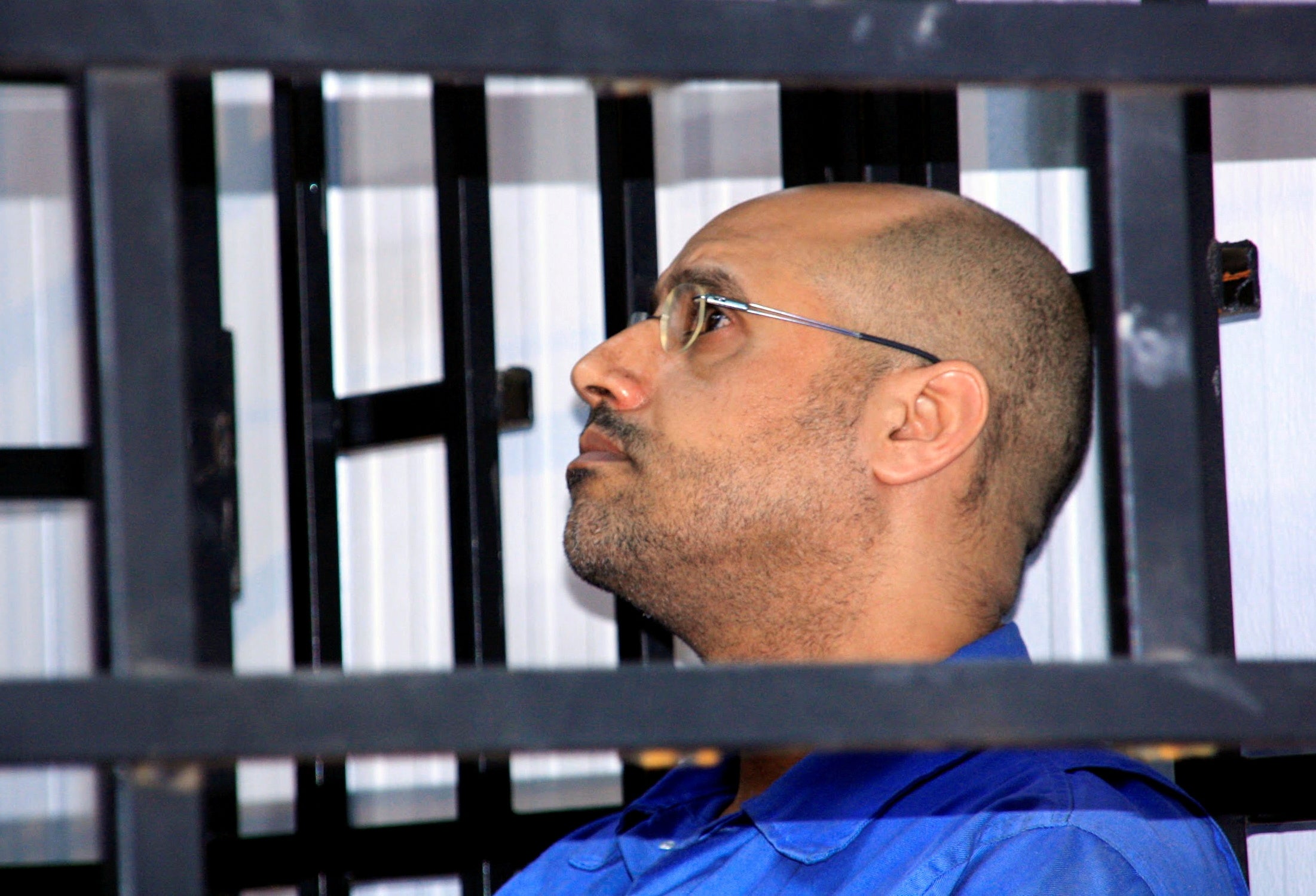Prodigy, prisoner, now presidential contender: Why Gaddafi’s son is making a bid for power in Libya
Saif al-Islam may not be allowed to run and is unlikely to win presidency but shock bid could position him as a future power broker, writes Borzou Daragahi


Your support helps us to tell the story
This election is still a dead heat, according to most polls. In a fight with such wafer-thin margins, we need reporters on the ground talking to the people Trump and Harris are courting. Your support allows us to keep sending journalists to the story.
The Independent is trusted by 27 million Americans from across the entire political spectrum every month. Unlike many other quality news outlets, we choose not to lock you out of our reporting and analysis with paywalls. But quality journalism must still be paid for.
Help us keep bring these critical stories to light. Your support makes all the difference.
He was known as the smart, favoured son of Libya’s former dictator, Muammar Gaddafi, groomed by his tyrannical father for leadership of the oil-rich nation.
He was hailed as a London-educated reformer who convinced human rights activists, scholars, and even Libyan dissidents that he was poised to bring democratic change to his nation.
But Saif al-Islam Gaddafi was ultimately a fierce defender of his father’s rule, making blood-curdling threats against Arab Spring insurrectionists before he was captured in 2011 and held prisoner for years by his enemies, losing the index finger he was famous for wagging at them in an explosion.
Now, four years after his release, Gaddafi, a grizzly and greying 49-year-old, begins a new chapter in his life, attempting to run for the presidency of his fractured, war-torn country after stepping out of the shadows.
On Sunday, Gaddafi registered to run for office next month in United Nations-backed elections that many fear won’t go ahead as planned.
Sitting in an office in the southern city of Sabha, Gaddafi wore a brown tribal gown similar to that donned by his father.
He cited verses from the Koran as he signed the electoral papers.
"God always prevails in his purpose, even if the unbelievers hate it,” he said.
The return of the scion of the country’s long-ruling dictator as a potential political player was a stunning twist in Libya’s decade-long slide into chaos.
“He’s participating in the very democracy that he and his father sought to brutally demolish, resulting in several wars since,” says Anas el-Gomati, a Libyan analyst at the Sadegh Institute, a think tank.
The timing of the announcement, just six weeks before scheduled 24 December elections, derailed the calculations of many of the entrenched political players who have jostled for power in Libya during the 10 years since Nato-backed rebels overthrew Gaddafi’s four-decade dictatorship.
On Tuesday, Khalifa Haftar, the warlord who has dominated Libya’s east, hastily announced that he would also run for the presidency.
"After many years of suffering, the doors of hope have opened before you to rebuild your country," he said in a speech, describing his run "not as a bid for power or status, but rather as leadership for the people at a crucial stage, towards pride, progress and prosperity.”
Hamid Dbeibeh, who is currently serving as transitional prime minister of the country’s UN-backed authority, will likely also run, garnering support from the popular northwest. The speaker of Libya’s eastern parliament, Aguila Saleh, is also expected to submit his candidacy in the coming days.
The country’s election commission must approve all candidates. Gaddafi, who remains wanted on International Criminal Court and Libyan arrest warrants, may not be allowed to run. Libya’s political environment remains unstable, and many question whether the elections will happen at all.

A war between armed groups supporting Haftar and those backing the government in Tripoli ended inconclusively last year.
Although he has support from the international community, Dbeibeh is considered a weak figure by rivals and Libya watchers.
The election build-up has only intensified competition between well-armed factions, and the results may spark renewed conflict rather than give legitimacy to any government that emerges. A 10 November video clip showed a controversial cleric, Sadeq al-Ghariani, encouraging Libyans to take up arms to halt the vote.
“There’s no way elections go well in the current context—with or without Saif,” says Virginie Collombier, a Libya expert at the European University Institute in Florence. “So many actors have an interest in derailing the whole process, before or after the vote.”
But even if Gaddafi is not allowed to run and elections don’t take place, a presidential bid helps legitimize him as a political player and could even rally lingering supporters of the former regime. It has the potential to make Gaddafi a powerbroker in any future Libyan political settlement.
“He was pretty much nothing for 10 years,” says Jalel Harchaoui, a Libya specialist at the Global Initiative Against Transnational Organised Crime. “Now he may turn into the leader of a bloc that other camps have to negotiate with.”
Gaddafi has been described as egotistical, if far more polished than his father and brothers. Educated at the London School of Economics, he is fluent in English and served as a liaison and interlocutor with international organisations and firms that sought to do business in Libya during the final years of his father’s rule.
Gomati suggests that a sense of entitlement drove him to run for president.
“He believes that Libya is his birthright,” Gomati says. “He says he wants to be president for all Libyans, but I think he wants to rule all Libyans.”
But in addition to his own ambitions, Gaddafi could also be serving other powers.

Over the last decade, Libya has become a venue for various foreign nations seeking to settle their scores with each other and build influence in North Africa. Turkey, the United Arab Emirates, France, Egypt, Qatar and Russia have all been maneuvering against each other, often using local proxy forces, political players or foreign mercenaries to pursue their interests.
Tarek Megerisi, a Libya expert at the European Council on Foreign Relations, said there were “clear ties between Russia and Saif.”
And last year, Bloomberg News reported on documents found on two alleged operatives of the Wagner Group, a Russian private paramilitary contractor. The documents suggested they had met three times with Gaddafi, offering him their services in helping promote himself as a political player in Libya and to use social media to hype his rise.
“His game plan is quite clear,” says Gomati. “He believes elections can be manipulated and rigged through social sentiment and ballot-rigging. Even a glance at social media shows the inorganic flow of sentiment being pushed to boost Saif al-Islam by some accounts that are possibly inauthentic.”
US State Department spokesman Samuel Werberg told an Arab news television channel that Gaddafi’s presence in any future government would be a "challenge for the international community.”
If he’s allowed to run, analysts described his chances of winning as slim, but not impossible. Many believe he will draw the most votes away from Haftar. In the notes found on the alleged Wagner operatives, he purportedly boasted that 80 per cent of Haftar’s supporters would back him as ruler.
Indeed, Haftar’s popularity has diminished in the east. Though he would find votes harder to come by in Libya’s heavily populated northwest, he may be building a political brand for a future power grab.
“He’s got a long game to come back, and these elections are kind of the opening gambit,” says Megerisi.
“The way he announced his candidacy was the way the old regime went about their business. They want to reclaim power and act as if 2011 was an aberration, and continue ruling their same way.”
Subscribe to Independent Premium to bookmark this article
Want to bookmark your favourite articles and stories to read or reference later? Start your Independent Premium subscription today.
Join our commenting forum
Join thought-provoking conversations, follow other Independent readers and see their replies
Comments